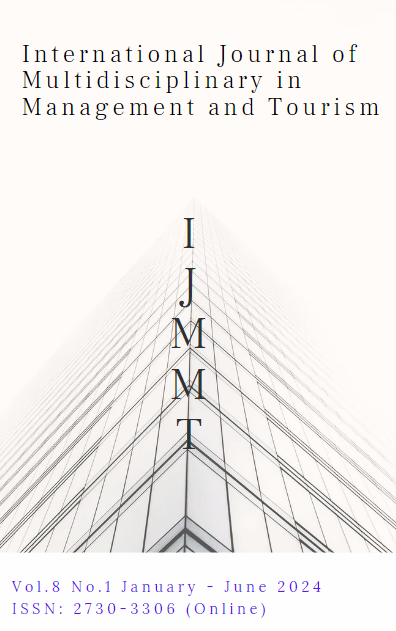Research on Farmers’ Entrepreneurship: Willingness, Behavior and Performance of Hunan Province Central China
Main Article Content
Abstract
In the new era, the principal contradiction facing Chinese society has undergone a major transformation. China has used Rural revitalization strategy, which is considered an important strategic change in China's urban and rural development. It is in line with the new trend of the two-way flow of resources and factors in urban and rural areas in the new era. and is an important means of resolving important conflicts in Chinese society.
This article aimed 1) to study the influencing factors of farmers' entrepreneurial performance in Hunan Province, 2) to analyse the impact of entrepreneurial willingness on entrepreneurial behaviour and entrepreneurial performance of farmers in Hunan Province and
3) to propose policy recommendations to promote farmers' entrepreneurial performance in Hunan Province. This study was conducted through a combination of qualitative and quantitative research. In the quantitative part, the sample was 400 peasant entrepreneurs in Hunan Province. They were selected by simple method, sent questionnaires to the farmer entrepreneurs in Hunan Province through questionnaire star, WeChat, QQ and email. Regarding the qualitative analysis, the sample consisted of 10 people, including 5 farmer entrepreneurs and 5 Ph.D.s in management who have been working in farmer entrepreneurship for many years. The instrument for collecting data has 2 types: questionnaires and in-depth interviews. Analysis data by percentage, mean, and standard deviation. And content analysis. The research results were found as follows;
1. The influencing factors of farmers' entrepreneurial performance in Hunan Province is Entrepreneurial behavior includes entrepreneurial team, entrepreneurial resources and entrepreneurial opportunities.
2. Entrepreneurial willingness has a direct positive effect on farmers' entrepreneurial behavior in terms of entrepreneurial opportunities, entrepreneurial resources and entrepreneurial teams. But entrepreneurial willingness will have an indirect positive effect on farmers' entrepreneurial performance through entrepreneurial behavior.
3. Based on the findings of the study, countermeasures to promote farmers' entrepreneurship in their hometowns are proposed: 1) Guide and support female entrepreneurship. 2) Emphasize entrepreneurship training and education. 3) Improve farmers' entrepreneurial willingness. 4) Enhance farmers' entrepreneurial behavior. And 5) Encourage multiple forms of entrepreneurship.
Article Details

This work is licensed under a Creative Commons Attribution-NonCommercial-NoDerivatives 4.0 International License.
References
Ajzen, I. (1991) The theory of planned behavior. Journal of Organization Behavior and Human Decision Processes, 50(2), 179-211. https://doi.org/10.1016/0749-5978(91)9 0020-T
Barbosaetal, O., Tratalos, J. A., Armsworth, P. R., Davies, R. G., Fuller, R. A., Johnson, P., & Gaston, K. J. (2007). Who benefits from access to green space? A case study from Sheffield, UK. Journal of Landscape and Urban Planning, 83(2-3), 187–195. https://doi.org/10.1016/j.landurbplan.2007.04.004
Blanchflower, D., & Meyer, B. (1994) A longitudinal analysis of young entrepreneurs in Australia and the United States. Small Business Economics, 6, 1-20. https://doi.org/ 10.1007/BF01066108
Corbett, A. C., Neck, H. M., & DeTienne, D. R. (2007). How corporate entrepreneurs learn from fledgling innovation initiatives: Cognition and the development of a termination script. Entrepreneurship Theory and Practice, 31(6), 829-852. https://doi.org/10.1111 /j.1540-6520.2007.00208.x
Corbett, A. C., Neck, H. M., DeTienne, D. R. (2007). How corporate entrepreneurs learn from fledgling innovation initiatives: Cognition and the development of a termination script. Entrepreneurship Theory and Practice, 31(6), 829-852.
Dandan, L., & Jianfu, L. (2017). Research on entrepreneurial willingness of college students' village officials from the perspective of entrepreneurial event model. Innovation and Entrepreneurial Education, 8(3), 52-56.
Duan, J. Y. (2012). Research on influencing factors of migrant workers' entrepreneurial willingness based on entrepreneurial event model. Mathematical statistics and management, 31(6), 958-964. https://doi.org/10.13860/j.cnki.sltj.2012.06.004.
Honggen, Z., & Lanyuan, K. (2013). Analysis of farmers' entrepreneurial expansion intention in less developed areas: Based on survey data of Jiangxi Province. East China Economic Management, 27(201), 101-104.
Honggen, Z., Huizhen, J., & Lanyuan, K. (2015). The Effect of entrepreneurial environment on entrepreneurial performance of farmers: An empirical analysis based on DEA-Tobit Model. Business research, (03), 112-118. https://doi.org/10.13902/j.cnki.syyj. 2015.03.016
Juan, W., Jiajia, Z., & Tianjun, L. (2020). The pioneering failure, together with peasants and entrepreneurial performance. Journal of Soft Science, 34(11), 59-64. https://doi.org/ 10.13956/j.ss.1001-8409.2020.11.10
Lafuente, E. M, Vaillant, Y., & Rialp, J. (2007). Regional differences in the influence of role-models: Comparing the entrepreneurial process of rural Catalonia. Regional Studies, 41(6), 779-795. https://doi.org/10.1080/00343400601120247
Lanlan, S., Yanling, P., & Rong, K. (2016). The Effect of entrepreneurial ability on the sense of entrepreneurial gain of farmers: An analysis of the mediating effect of entrepreneurial performance and the moderating effect of entrepreneurial motivation Agricultural technology economy, (12), 63-75. https://doi.org/10.13246/j.cnki.jae. 2016.12.007
Liu, Y., & Wei, F. (2014). Research on the relationship between micro-environment and peasant entrepreneurial performance - based on an empirical analysis of 223 peasant entrepreneurs in Shaanxi Province. East China Economic Management, 28(9), 167-171.
Qiangqiang, Z., Xixi, W., & Hongyu, M. (2022). How three-dimensional capital improves farmers' entrepreneurial performance: The role of entrepreneurial learning and entrepreneurial opportunity identification as chain mediators. Agricultural Economics and Management, (03), 28-41.
Qingjun, Z., Fean-Fan, Z., Chun-Ping, Q., & Bi-Fen, Z. (2018). Analysis on entrepreneurial willingness of land-lost farmers and its Influencing factors: Based on survey data of A City in Fujian Province. Journal of Hunan Agricultural University (Social Sciences Edition), 19, (118), 67-72.
Shane, S., & Venkataraman, S. (2000). The promise of entrepreneurship as a field of research. Academy of Management Review, 25(1), 217-226.
Tao, Z., Zhi, Z., & Shangkun, L. (2020). Digital economy, entrepreneurial activity and high-quality development: Empirical evidence from Chinese cities. Management world, 36(10): 65-76. https://doi.org/10.19744/j.cnki.11-1235/f.2020.0154
Xiuzhi, Z., Lezhi, Q., & Yifeng, Z. (2019). Farmers entrepreneurial performance influence factor analysis and empirical test. Journal of Statistics and Decision, 35(15), 109-111. https://doi.org/10.13546/j.cnki.tjyjc.2019.15.025
Yumeng, W., Xiaoqi, Y., & Xiangzhi, K. (2022). Self-efficacy, resources together with farmers entrepreneurial performance analysis. Journal of huazhong agricultural university (social science edition), (01), 83-93. https://doi.org/10.13300/j.cnki.hnwkxb .2022.01.009
Zhengyun, R., Qinghua, S. (2018). the mechanism of improving the entrepreneurial performance of migrant workers in China: Theoretical model and empirical test based on the comprehensive model of "competence-resource-cognition". Agricultural economy, 4, 108-120. https://doi.org/10.13246/j.cnki.iae.2018.04.012

